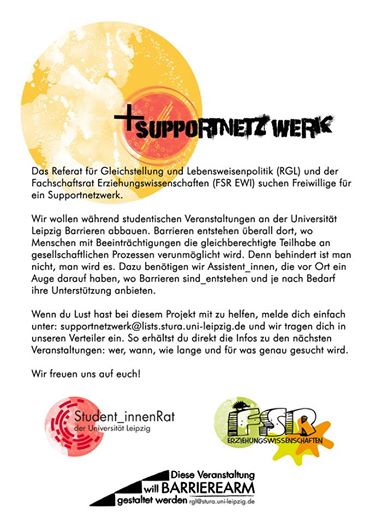Equality and Life Policy Unit
What do we do?
Equality and Lifestyle Policy Unit (RGL) actively promotes equal rights and equality in general for all genders and diverse lifestyles at our university and in Leipzig.
Equality - means equal opportunities, equal rights and equal participation in (university) life for all — regardless of their gender and sexual identity. (Promoting equality for persons with disabilities is the responsibility of the Inclusion Unit.)
Lifestyle Policy - means respecting and ensuring equality for all forms of love, desire, relationships and family. The spectrum of sexual and romantic orientation is as diverse as genders and gender identities are. Each person decides for themselves whom (can be more than one person) and in what way they love, as well as how often and with whom they engage in sexual relations. The decision of how much to share about these aspects is also solely up to that person.
Intersectionality - emphasises the interconnected nature of different social categories (e.g., gender, sexuality, race, ethnicity, religion, age, class). These connections also manifest in multiple forms of discrimination. For example, racism may overlap with homophobia, transphobia, or poverty-based discrimination. When examining, addressing, and fighting discrimination, these intersections must absolutely be considered and placed in the appropriate context.
Consent
Communicating and asking for consent is essential for engaging in any sexual, romantic, or platonic interaction. If you wish to touch someone or interact with them in any other way, always ask for their permission first. Remember, only a clear “yes” means yes!
How to use gender-neutral language in German?
A person’s gender is not something to assume. People can be cis, trans, binary, non-binary, or agender. So how to refer to them if all nouns in German have grammatical gender?
There are various ways to do this. Here you can find a brief overview of the pros and cons of each option.
Referent_in, Referent*in, Referent:in, Referent’in - these symbols create space for, e.g., non-binary or agender people. You can use them if the person’s gender is unknown.
Referentix, Referentlon - gender-neutral forms used for non-binary or agender individuals
Referent - a masculine form used for individuals identifying as men
Referentin - a feminine form used for individuals identifying as women
Help! What do the words in brackets after a person’s name mean? - They are there to make communication simpler — these are pronouns that indicate how to refer to someone in the third person. The first word is the personal pronoun, the second one is the possessive pronoun. If a third word is included, it usually indicates the article to use if needed. You can learn more about German pronouns at nibi.space.
Glossary
cis - someone whose gender identity matches their sex assigned before/at birth
trans - someone whose gender identity differs from their sex assigned before/at birth
binary (binär) - someone identifying as male or female
non-binary (nichtbinär) - someone not identifying as male or female
agender (ageschlechtlich) - someone feeling outside the gender spectrum
Gender-Inclusive Language in the School Context of Saxony
Students, teachers, school administrators, social workers, and interns at schools in Saxony should be free to refer to people’s genders in writing using special characters (e.g., gender asterisks).
Looking for FLINTA* musicians!
Gender-sensitive party music?
YES PLEASE! Looking for FLINTA* musicians!!!
We want to create a list or database of music-making individuals in and around Leipzig who identify as queer women, lesbians, trans, intersex, or feminist. That’s why we need your help and your knowledge!
Post or write to us if you know someone — or feel free to promote yourself, especially if you’re looking for musical support!
We’re looking forward to your submissions and suggestions!
Contact: rgl@stura.uni-leipzig.de …because: EMPOWERMENT rules!
Get Involved: Our Support Network
